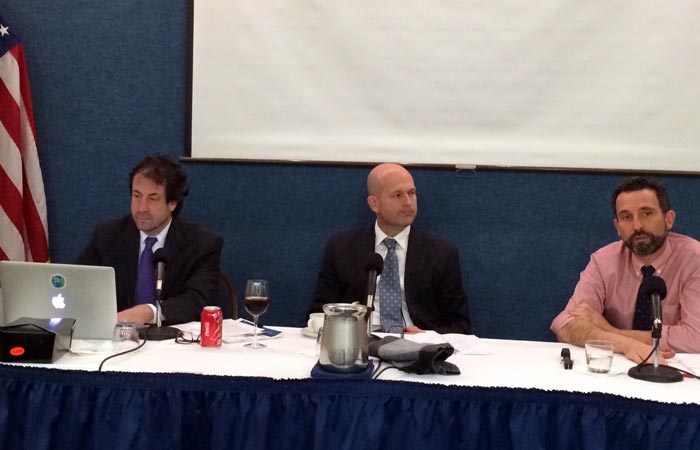
Medill Professor Josh Meyer (left), moderates a discussion between Richard Andres (center) and Omer Taspinar, both professors at the National War College in Washington D.C. (Mary Cirincione/MEDILL)
Gap between aspirations and expectations leaves Western Muslim youth open to radicalization
WASHINGTON—The global reach of ISIS has left an indelible mark on the media worldwide, providing cautionary tales on the susceptibility of western Muslim youth as some young people leave their homes to join terrorist ranks abroad. Drawn by a savvy use of social media and digital propaganda, their shared story is becoming more common.
“Social media has spread radicalism globally to people who normally wouldn’t be exposed to it,” according to Richard Andres, a professor of national security strategy at the National War College. The ease of access made possible by 140-character tweets, messages and videos has created a new playing field, he said, enabling terrorist organizations to penetrate groups of dissatisfied people in mass.
Authorities picked up three Denver teens en route to Syria last fall, while another three fled East London in February. All six were active online, maintaining Facebook and Twitter accounts where they interacted with extremist points of view.
“Social media click-washes you over time,” something Andres likens to brainwashing. This process pulls readers and viewers “further and further toward the extreme” with every click, he said.
Speaking at a National Press Club event Monday sponsored by the Medill National Security Journalism Initiative, Andres said those initial clicks are fueled by innate prejudices: “We’re attracted to things that confirm our biases.” It’s a slippery slope from there as social media users access more content aligned with a single view point, he said. “Like a cult, it will isolate you … making you more and more extreme.”
That’s all part of its strategic approach, he said. Those brutal beheading and execution videos regularly released by ISIS were never part of the endgame. They’re clickbait.
“We like sensation. Human beings are attracted by sensation and so people tend to click on the more sensational link,” Andres said. Once they do that, ISIS can further its primary mission by “linking those social media users with major headlines and gain legitimacy.” That means linking to real stories describing the group’s presence, violence and aims.
According to a study released late January by the International Centre for the Study of Radicalisation and Political Violence, one-fifth of all foreign fighters joining ISIS are westerners. Of an estimated 20,000 worldwide, more than 4,000 recruits have come from Europe, while 100 have come from the U.S. Young Internet users appear to account for the majority.
Speaking at the same event, Brookings fellow Omer Taspinar described a crisis of identity, as some young Western Muslims appear integrated into their communities, but in reality suffer degrees of alienation. “They don’t feel that they belong to their immigrant groups,’ or their parents’ generation … They have an identity problem and in that sense they feel uprooted, that they don’t belong anywhere.”
At that point it becomes an issue of relative deprivation, Taspinar explained. These radical teens aren’t uneducated or down-trodden. Most are bilingual, even trilingual. “The evidence that we have from profiling terrorist groups is that most of the time, masterminds [and] people who are successful terrorists … are not really poor. They’re middle class and they’re educated,” Taspinar said.
But their grievances are real and they’re wildly discontented, he added. Many are either unemployed or underemployed, leaving them vulnerable to clickbait propaganda. “There’s a growing gap between expectations and opportunities,” Taspinar said. Increasing rates of education in Europe coupled with unemployment problems have resulted in broad dissatisfaction.
“So they’re looking for something bigger than themselves. [They’re] looking for a cause to attach themselves to.” And that cause is the self-proclaimed Islamic State, Taspinar said, as youths embrace the rise of a caliphate as their reason for being.





